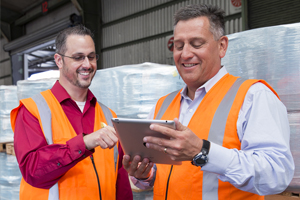World Cargo News recently talked to us about the launch of our suite of new mobile apps. The article is reproduced below.
Jade Logistics has launched a suite of 30 new web-based hand-held mobile apps for its Master Terminal TOS. The apps deploy mobile functionality and data capture ability to any internet-connected mobile device running the Microsoft, Android or Apple operating systems.
With the new apps, Jade is ready to support ports’ deployment of TOS functionality at different levels to different roles on the terminal, without requiring proprietary ruggedised devices that it views as expensive and lacking flexibility.
The apps include a vehicle app for mobile equipment operators. Depending on the task, and the driver’s preference, various views are available including a graphical view and a list view. Among other features, users can toggle night mode, select twinmode and customise the app to display the most important information in the most prominent areas on screen.
Like all the Jade apps, the Vehicle app is updated at the server level, so there are no software updates needed at the device level to maintain the app.
Delphine Ducaruge, product manager, said the need for 30 different apps reflects the diversity of specific roles at marine terminals, and each app is for a specific purpose, such as truck checking at a gate, or reefer container monitoring. There is, she added, no risk that the number of apps could become a source of frustration to people on the ground using the Jade Master Terminal TOS. An administrator decides who has access to what apps, and most users will typically have access to only “a couple”, and will stay in a single app for several hours while they work.
Grupo CICE in Veracruz was part of the beta programme to test the new Master Terminal web-based mobile apps. “The suite of 30 web apps spans CICE’s entire port operation, from splitting and merging cargo, through to loading or unloading a truck, and replaces their long-serving Windows applications,” stated Jade. “CICE, who are forwardthinking technology enthusiasts, rigorously tested the new apps over a two-month period, working closely with Jade Logistics to ensure the functionality developed would deliver real benefits to their port.”
Genaro Mendez, director of information technology at CICE commented that the new web-based apps were a welcome addition to the company. “Today’s terminals must be more responsive,” he said. “They must adapt to new technology quickly to remain competitive. We recognised the benefits the web apps would deliver, and made the decision to upgrade as soon as they were released.”
The ability to use commodity hardware also resonated with CICE. “We no longer need to invest in expensive ruggedised equipment. Today’s readily available and inexpensive tablets and smartphones, with a supported web browser, are all that is required to use the apps,” said Mendez.
Using smartphones, tablets or laptops instead of so-called ruggedised devices challenges the conventional wisdom about the working environment in ports. As WorldCargo News has discussed previously, ports often purchase expensive ruggedised devices with high IP and Mil-Spec ratings that have proved to be more durable in industrial applications.
However, the gap between ruggedised and commodity devices has closed significantly in recent years (the iPhone 8 is rated to IP67, for example), and cases/covers can be used for extra protection.
Jade believes its apps can replace mobile computers connected to a TOS, across virtually the whole terminal. The STS cranes are the exception, and Ducaruge noted that, for safety reasons, “ports don’t want to add extra technology to the STS cranes”…
Published World Cargo News: November 2017.

